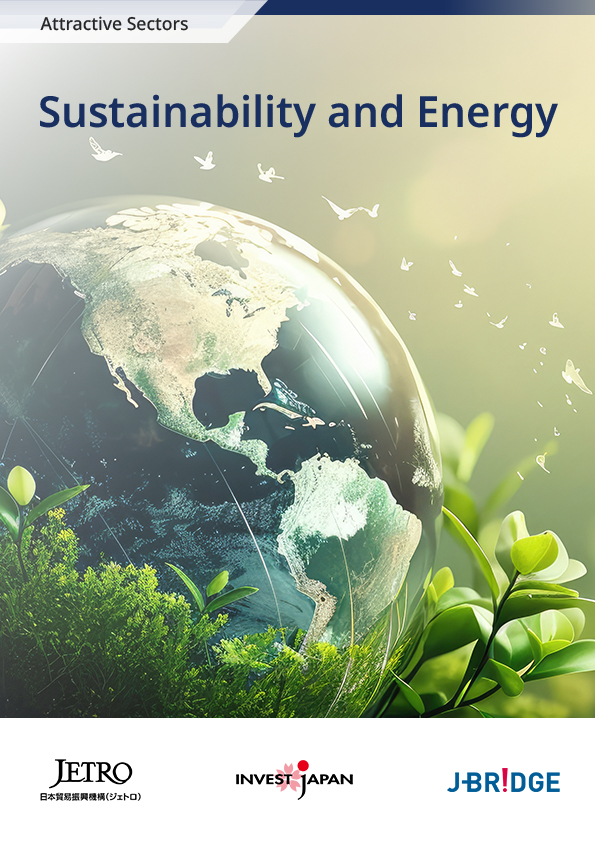To establish a stable and self-sufficient energy system, Japan is investing in green energy and green transformation technologies. The target is to achieve a share of renewable energy of 38% by 2030.
Sustainability and Energy
Government Initiatives

Strengthening Market Competitiveness in Green Transformation and Energy to Achieve De-carbonization, Stable Energy Supply, and Economic Growth
(1) Establishment of a Basic Policy for Achieving Green Transformation
In February 2023, the Green Transformation (GX) Promotion Strategy was formulated in response to increased competitiveness of long-term, large-scale investment in green transformation and recognition of challenges in energy security. The strategy consists of two main frameworks: (i) green transformation initiatives based on the basic premise of securing a stable energy supply, such as the use of renewable energy as the main electric power source and energy conservation; (ii) realization and implementation of "growth-oriented carbon pricing concept," etc., including upfront investment in the private sector, etc. 6 (Figure 4).
Prime Minister Kishida has announced his intention to achieve over 999.5 billion USD* (150 trillion JPY) of public and private green transformation investment over the next 10 years [including about 133.2 billion USD* (20 trillion JPY) of upfront investment support from the government], and further expansion of green transformation investment is expected in future7.
Figure 4: Overview of the Green Transformation Promotion Strategy
| (1) Promoting intensive energy conservation |
|
|---|---|
| (2) Making renewable energy the main energy source |
|
| (3) Utilizing nuclear energy |
|
| (4) Other important matters |
|
| (1) Upfront investment support through GX Economy Transition Bonds |
|
|---|---|
| (2) GX investment incentives through Growth-oriented Carbon Pricing (CP) |
|
| (3) Using new financial methods |
|
| (4) GX for international strategies, fair transition, SMEs, etc. |
|
| (5) Promoting GX throughout society |
|
(2) Introduction of FIT and FIP Schemes
Feed-in Tariff (FIT) is a scheme under which the Japanese government commits to purchase electricity generated from renewable energy sources at a fixed price for a fixed period of time8. The high construction costs incurred by the energy companies for energy generation facilities are also expected to be recovered, thereby promoting the spread of renewable energies.
Business operators are required to develop a business plan that meets the national requirements using one of the eligible energy sources (solar, wind, hydro, geothermal, or biomass). All electricity generated (excluding for personal use) is eligible for purchase9.
In addition, the Feed-in-Premium (FIP) scheme was introduced in FY-2022. FIP scheme allows electricity producers to independently sell the electricity they generate on the market and add a premium to the selling price10. The difference with the FIT system is that the purchase is carried out at a variable price, which creates an incentive to increase the supply of renewable energy when the demand or the market price rises. Through this, the use of renewable energy is expected to increase, such as through the storage of electricity in batteries.
(3) Implementation of Electricity System Reform
The electricity system reform currently being promoted by METI has three main pillars: (i) expansion of transmission line operation over a wide area; (ii) complete liberalization of retailing; and (iii) further securing the neutrality of the electricity transmission and distribution sector through legal separation11. Based on the above-mentioned electricity system reform, four market systems have been established12 to ensure a fair access environment to energy sources (Figure 5). By transferring energy management, which was previously handled by government organizations, to the market, efforts are being made to achieve more affordable and effective electricity distribution. Through these initiatives, electricity trading and supply-demand adjustment at private sector level are expected to increase.
Figure 5: Overview of the four market systems based on Electricity System Reform
| Capacity Market |
|
|---|---|
| Baseload Market |
|
| Supply/Demand Adjustment Market |
|
| Non-fossil Value Trading Market |
|
(4) Initiatives by Local Government Agencies (Zero Carbon Cities)
The Japanese government is promoting the increase of "Zero Carbon Cities," where local governments aim to achieve net zero greenhouse gas or carbon dioxide emissions by 205013. Prefectures and municipalities are committed to formulating and implementing comprehensive and systematic measures to reduce greenhouse gas emissions, etc., in accordance with the natural and social conditions of the region14. As of December 2023, more than 1,000 municipalities have declared themselves to move towards zero-carbon, with effective and innovative initiatives and ordinances being implemented or enforced.
-
*
Calculated based on the Bank of Japan exchange rate of 1 USD at 150.07 JPY (as of March 1, 2024)
References
- Cabinet Secretariat. Outline of the Strategy for Promoting the Transition to a Decarbonized Growth Economy Structure (GX Promotion Strategy).
- METI. Cabinet Decision on the Basic Policy for the Realization of Green Transformation.
- Agency for Natural Resources and Energy. Renewable Energy FIT/FIP Guidebook (2023 Edition) (JP), p. 4.
- See Note 8, p. 6.
- See Note 8, p. 4.
- Agency for Natural Resources and Energy. About Electricity System Reform (JP).
- Agency for Natural Resources and Energy. Challenges regarding Further Review of the Electricity System (JP), pp. 13-24.
- Ministry of the Environment. Toward Achieving Carbon Neutrality by 2050 (JP).
- Ministry of the Environment. Status of Local Governments Announcing Zero Carbon Dioxide Emissions by 2050.
-
Overview
Promoting Renewable Energy to Achieve Stable Energy Self-Sufficiency and Carbon Neutrality

-
Attractive Markets
We Focus on Following Five Attractive Markets With Growth Potential in the Environment & Energy Industry
-
(1)
Offshore wind energy: Active market entry by foreign companies
-
(2)
Biomass: Advancing institutional development in terms of costs
-
(3)
Solar energy: The largest renewable energy source in Japan
-
(4)
Hydrogen: World-leading R&D and implementation
-
(5)
Storage batteries (lithium-ion): Diverse commercialization and international collaboration

-
Sustainability and Energy Report

You can download the whole report on the webpage free of charge. Please simply fill out the form below to get information on promising industries in the Japanese market. Download now and use the information for your success in business.
-
- Business Expanding
- Sustainability & Energy
- USA
Enphase Energy, a leading manufacturer of solar microinverters, establishes an office in Chiyoda, Tokyo
-
- Business Expanding
- Sustainability & Energy
- Canada
BluWave AI, Driving AI-Powered Energy Optimization, Establishes Office in Minato, Tokyo
-
- Business Expanding
- Sustainability & Energy
- Singapore
Singaporean Cleantech Startup uHoo Establishes Japan Subsidiary - Promoting "Visible" Indoor Air Quality through Smart Sensing Technology -
Contact Us
Investing in and collaborating with Japan
We will do our very best to support your business expansion into and within Japan as well as business collaboration with Japanese companies. Please feel free to contact us via the form below for any inquiries.
Inquiry FormJETRO Worldwide
Our network covers over 50 countries worldwide. You can contact us at one of our local offices near you for consultation.
Worldwide Offices



























